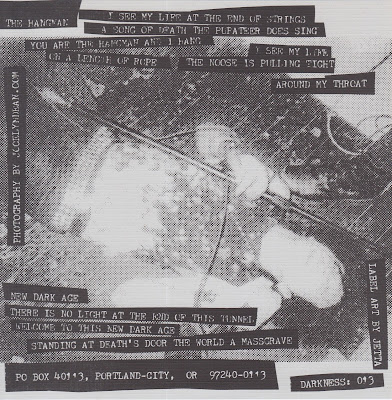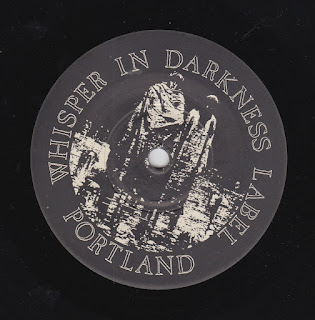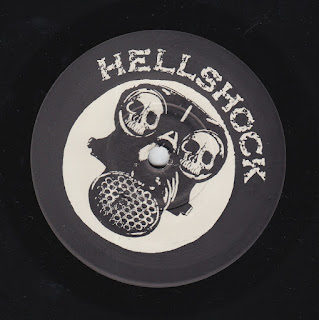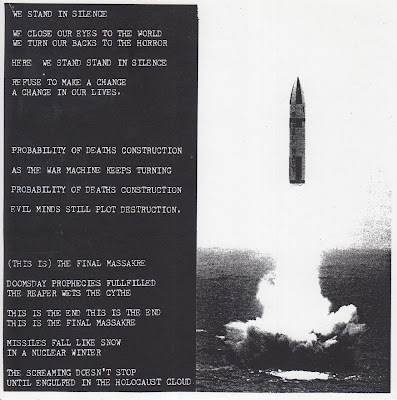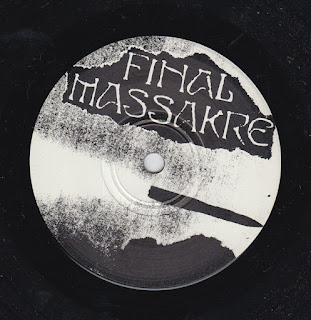Deathcharge almost made it to the "Chronicles of Dis" series I did a few months ago and to be honest, if I had physical copies of their first two Ep's, they would have. Sadly, when I had the chance to get them years ago for a normal price (aka "a decent price" since Discogs took over), I didn't take it and opted for records with covers depicting orcs wielding axes and causing havoc instead. C'est la vie... But the inclusion of Deathcharge in the PDX series is just as relevant and hopefully I will manage to get a copy of the "Plastic smiles" Ep in time for a possible sequel to the aforementioned Dis-series (I'm still working on a name and taking suggestions).
For a long time, Deathcharge was just a band that did what their name suggested: Discharge-worship. And they were good at it too. I distinctly remember them being praised for trying "just like Disaster" to sound "just like Discharge". Deathcharge were a "just like" band and I feel there is a quixotish beauty to it. No one has ever actually sounded just like Discharge and no one ever will, but many will keep trying, against all odds, aware of the illusoriness of the task, making the fight a romantically doomed one, but re-affirming not only the uniqueness of Discharge but also the relevance of this traditional punk discipline. Silly Discharge-worship may be a shibboleth to some, but it is one I am unashamedly proud of. And so were Deathcharge when they formed. The name is pretty self-explanatory (I love the fact that, when pronounced quickly, "Deathcharge" almost sounds JUST LIKE "Discharge"! Top meta stuff, right?) and as you would expect, their first Ep, the cheekily named "A look at their sorrow" from 1997, was a solid D-beat offering, packed with specific Discharge references (in the song titles with "A look at their sorrow", "The price of violence" and "Fear their power", and also in the actual songs, the chorus to "Fear their power" is the exact same as "Drunk with power" with just a few changes in the words). In terms of sound, this Ep sat comfortably between Totalitär and early Hellkrusher and it remains a solid specimen of 90's D-beat.
At that time, the line-up was made up of Adam on vocals and Roger on drums (both of them formerly in Masskontroll and the only members who have been in Deathcharge all along), Matt (Religious War, Blood Spit Nights, Dog Soldier...) on the bass, and Gabe and Colin on guitars. By 2001, Matt had left and Adam also played the bass for single-sided Ep "Plastic smiles". Now, this is indeed a record that sounds almost "just like Discharge" actually. But there is a very smart twist as the three songs included are all classic early Discharge mid-tempo songs, therefore not technically D-beat songs. It does raise the question of Discharge likeness when taken from the angle of track order and how it also creates meaning. If the three Deathcharge songs on "Plastic smiles" certainly rate as some of the best mid-paced Dis songs I have heard, the fact that they use a systematization of a mid-paced beat that Discharge used precisely as a means to balance and also emphasize their faster, proper D-beat songs is a shift from the global structure of Discharge writing. I still really like the Ep though and I actually love the concept but arguably, the inclusion of a couple of classic fast Discharge tracks would have brought Death closer to Dis in terms of the Discharge matrix of meaning creation. It could have hit the Dis-nail on the head in a spectacular fashion.
But enough disgressions already, especially since the eponymous 2005 Ep is not a D-beat record. In fact, despite an obvious Discharge influence, it doesn't really even try to be a dis-record - which is kinda weird from a band called Deathcharge, I'll give you that. Prior to this Ep, the band had recorded a demo in 2004 with their new line-up that saw the arrival of Chris (from Defiance, Religious War and even Poison Idea at the time) on guitar and Joe (from Assassinate) on bass. This tape demo (that is apparently pretty hard to find now) is probably my favourite Deathcharge recording. It already had what would make the subsequent Ep so good and unique but also kept a genuinely great hardcore punk basis. In my opinion, it is one of the strongest PDX punk recordings of the 00's and I cannot believe it has not been reissued yet. The mood of the demo is much darker than before, which definitely hinted at what the band was up to in terms of songwriting, and the five songs feel very cohesive, both individually and collectively. It includes three fast dischargy songs that would make any "raw punk" fan drool for their actual rawness and urgency, the perfectly timed vocals and the sound textures. They bring to mind the sound early Sacrilege, 83/84 era Varukers or early Hellkrusher, with a distinct Californian peace-punk vibe in the songwriting. Clearly top shelf. The remaining two songs are more metallic and moody, but not in a crust or metal punk way, rather they evoke post "Hear nothing", thrashy Discharge, but without the cheap glam touch, and late Antisect, dark and heavy, but not crushing or brutal. These two tracks are the foundations of the 2005 Ep.
The record contains two songs, "The hangman" and "New dark age", and I remember that, upon hearing it for the first time, I thought that I had never really listened to anything like it. Although there were enough familiar elements for me to relate wholly to it, I was still at a loss to describe the Ep. It is a genuinely dark record. Now, I realize the term "dark punk" has been overused and misused lately but I can't really think of a more relevant term. But it is 80's dark, clearly, as the Ep has a very peculiar 80's vibe (let's say 1986) in the songwriting and the overall mood. While the vocals remained very hardcore-sounding on the demo, here they have an almost goth quality but keep a very raucous tone that gives a dark incantatory aura to the songs that is not unlike Zygote or Bad Influence. There is mid-paced, heavy and groovy metallic riffing here, and mid-80's Discharge (for a long time one of punk's most tragic taboos) and late Antisect are relevant comparisons, but the purpose of Deathcharge is different. The songs are atmosphere-oriented, they sound like raw "danses macabres", they have that strange occult feel, lusting for death, and, dare I say it, are ultimately pretty glamourous and even sexy (if you are into morbid stuff but still like a bit of sophistication and velvet). As well as Discharge and Antisect, Smartpils and post-Amebix bands like Zygote and Muckspreader could be interesting postulates here, and I guess there were some Coitus songs that had a somewhat similar vibe, especially on the first demo, and even late Anti-System or English Dogs can be invited to the party too. But Deathcharge really created something with this Ep, something that certainly appealed to the Antisect fanboy in me and showed me that the way you tell a story is as important as the diegesis and that the meaningfulness of the output is completely conditioned by the narrator. And man, the two stories from this record, even though they are objectively heavy 'n' groovy metallic goth-punk numbers, utterly echo with the label's name: whispers in darkness indeed.
Like with any self-respecting PDX punk band, this Deathcharge Ep is highly referential, from the glam-punk picture of the boys on the cover, the "Grave new world" font they used, the riff from "The more I see" they nicked, to the Antisect nod in the title "New dark age". But despite all these familiar things, no one sounded like Deathcharge then and even the Ep itself looked like no other at the time (Discharge-loving goths with charged hair and studs?). Although the so-called postpunk/dark punk revival certainly borrowed from this unpretentious record and sometimes explored the same paths, I cannot think of many recent bands that wrote songs that were as inspired and inspiring. Following the Ep, Deathcharge released an album, "Love was born to an early death" in 2011, with Dusty from Hellshock on guitar and Frank from Lebenden Toten on the bass, that unfortunately did not live up to the Ep in terms of songwriting. Not a bad record by any means, but probably one that I was expecting too much from, hence a possible lack of judgement here.



